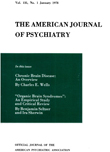EXCESSIVE INFANT CRYING (COLIC) IN RELATION TO PARENT BEHAVIOR
Abstract
1. The interaction between parents and infants and its relationship to crying was studied in 18 infants from 13 families.
2. Crying was found to be a response to tension which arose internally from unsatisfied needs or from inappropriate external stimulation.
3. The quantity of this tension was affected by the parent's behavior as it related to the satisfaction of the infant's needs.
4. This behavior was perceived by the infant through the sensory and proprioceptive systems.
5. The parents of babies who cried excessively responded inappropriately and inconsistently to their infant' needs with over-stimulation or with relative neglect.
6. The infants who cried excessively did not develop security in interpersonal relationships to the same extent as those who cried very little.
7. In addition to excessive crying these infants demonstrated deviations such as: regurgitation, night-waking, growth failure, nasal hyperfunction, increased muscle tension, variability in gastrointestinal functions and absolute eosinophil counts. They also had frequent illnesses.
Access content
To read the fulltext, please use one of the options below to sign in or purchase access.- Personal login
- Institutional Login
- Sign in via OpenAthens
- Register for access
-
Please login/register if you wish to pair your device and check access availability.
Not a subscriber?
PsychiatryOnline subscription options offer access to the DSM-5 library, books, journals, CME, and patient resources. This all-in-one virtual library provides psychiatrists and mental health professionals with key resources for diagnosis, treatment, research, and professional development.
Need more help? PsychiatryOnline Customer Service may be reached by emailing [email protected] or by calling 800-368-5777 (in the U.S.) or 703-907-7322 (outside the U.S.).



